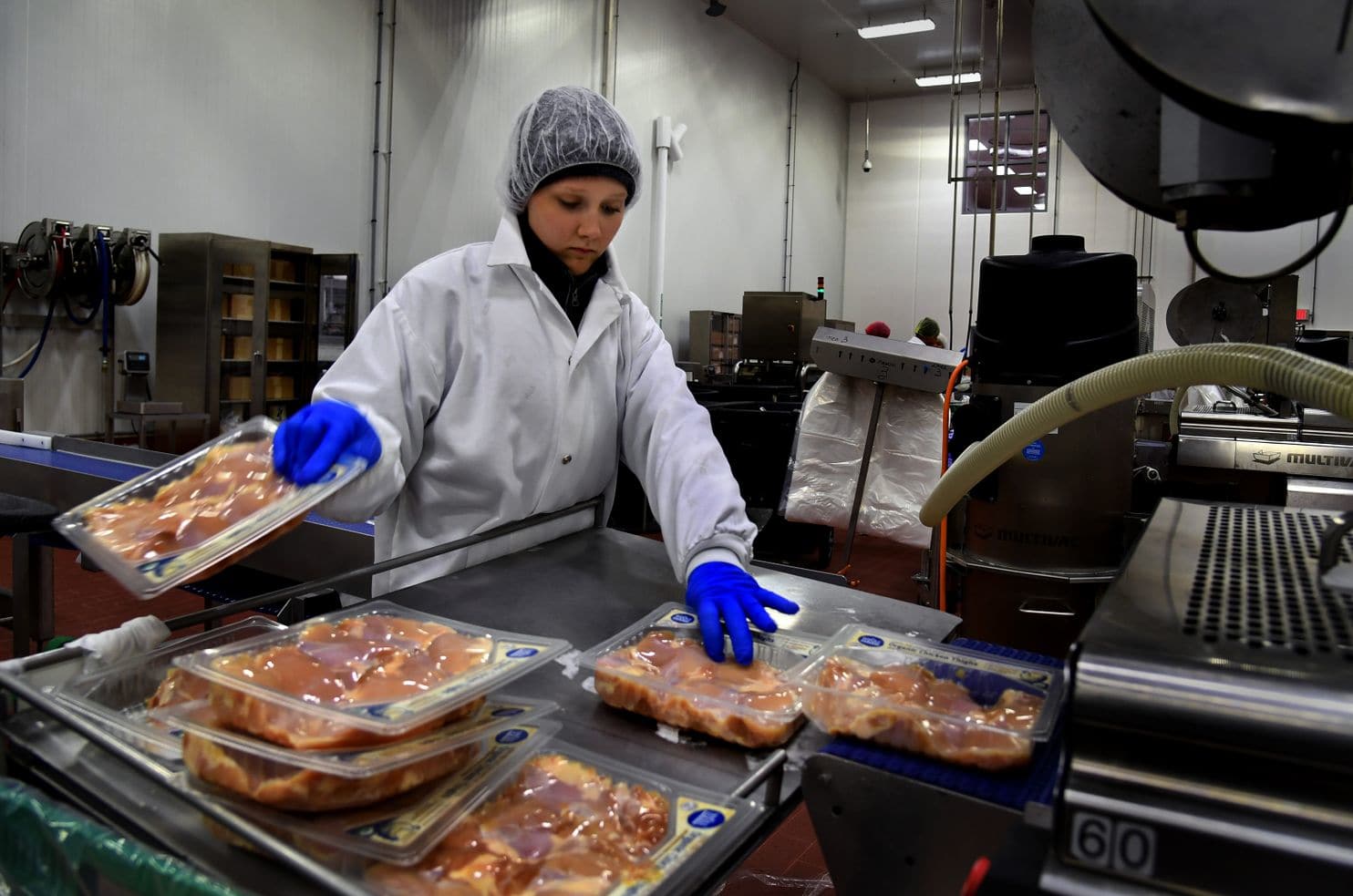Washington Post: Consumers are buying contaminated meat, doctors’ group says in lawsuit

by Kimberly Kindy | April 17 at 6:00 AM
A group of doctors has filed a lawsuit against the U.S. Department of Agriculture, pushing for new rules to prohibit the sale of raw poultry, pork and beef that contain traces of animal waste — something that is currently allowed under law.
The Physicians Committee for Responsible Medicine, a nonprofit group composed of 12,000 doctor members, is also seeking to have the word “wholesome” removed from the inspection label of poultry products. Instead, the group, which advocates for improving human and animal lives through plant-based diets, is proposing a new warning label for both poultry and meat that would alert consumers to the possibility that the products may contain fecal matter.
USDA says it has a “zero tolerance” policy for fecal contamination in poultry and meat-processing plants, but this applies only if the fecal contamination is visible.
“Americans deserve fair notice that food products deemed ‘wholesome’ by USDA would be deemed disgusting by the average consumer and adulterated under any reasonable reading of federal law,” the group said in a 2013 petition it filed with the USDA, seeking the changes.
The lawsuit asks USDA to provide a “substantive response” to the Physicians Committee’s six-year-old petition. Under federal law, the agency is required to respond to petitions within “a reasonable time” but does not set a deadline. The suit was filed Tuesday in U.S. District Court in Washington.
USDA said Tuesday it “disagrees with the underlying assumption that meat and poultry products bearing the mark of inspection are likely to be contaminated with feces.”
“Visible fecal contamination is considered a food safety defect that can be removed by trimming” off the area of contamination and by cleaning the area with antibacterial chemicals.
“Regarding fecal contamination of carcasses that is not visible to the human eye,” USDA officials said pathogen testing is in place at critical points along the slaughter line “to monitor (the plant’s) ability to maintain process control sufficient to prevent fecal contamination.”
The agency encourages consumers to follow cooking guidelines to ensure pathogens are destroyed in poultry, pork and beef.
The legal action comes days after the Centers for Disease Control and Prevention announced that E. coli-contaminated ground beef was the suspected culprit in an outbreak that has infected at least 109 people in six states. CDC says 17 people have been hospitalized, though no deaths have been reported.
CDC estimates 48 million people get sick, 128,000 are hospitalized, and 3,000 die from foodborne diseases each year in the United States.
KatieRose McCullough, the North American Meat Institute’s director of regulatory and scientific affairs, said it’s important to distinguish between fecal material that is naked to the human eye and the types of pathogens that cause foodborne illnesses.
“It’s no surprise that the pseudo-medical animal rights group Physicians Committee for Responsible Medicine doesn’t know the difference between fecal contamination and bacteria on meat products,” McCullough said. “Bacteria like E.coli are naturally present in the environment as numerous studies on all types of items from foods to phones, keyboards and toothbrushes have shown. This does not mean any of those items are contaminated with feces.”
A spokesman for the National Chicken Council, a trade group for the poultry industry, said USDA has “a zero-tolerance policy for fecal material entering the chiller,” referring to a large container of cold water and antimicrobial chemicals that chicken carcasses are placed in after slaughter and cleaning. This controls the growth of bacteria.
“Every piece of chicken is subject to rigorous inspection by both trained company personnel and federal inspectors,” spokesman Tom Super said.
The Physicians Committee filed its petition after it conducted a series of tests on chicken products purchased in grocery stories across the nation. In 2011, the group tested 120 chicken products sold by 15 grocery store chains in 10 U.S. cities for the presence of fecal bacteria. Forty-eight percent of the products tested positive, the group said. In April 2012, it tested chicken products purchased in an additional 10 grocery stores around the country: 48 percent tested positive. Then in November 2012, it tested chicken products from 10 grocery stories in Buffalo: 62 percent tested positive.
“Consumers are being misled,” said Deborah Dubow Press, an attorney for the Physicians Committee, which advocates for preventive medicine through proper nutrition. “We don’t like the direction USDA is going, giving the industry more control over meat inspection. They are not doing enough to protect consumers.”
Bill Marler, a prominent food-safety lawyer, said the group’s request “has merit.”
Marler filed his own petition in 2009, seeking to force USDA to label five strains of E.coli as an “adulterant.” He ultimately prevailed. There are now six strains of E.coli — which is found in fecal matter — that cannot enter the marketplace in raw form. Producers must destroy it or use it in processed, cooked products.
“It’s a broad brush approach; I don’t disagree with it,” said Marler, who worked with Senate and House committees in 2009 and 2010 to pass new food-safety regulations for the Food and Drug Administration. “It just says all poop in food shouldn’t be there. That isn’t an irrational point of view. If you asked most consumers whether or not there should be a ban on feces in your food most consumers would say, “That’s a really great idea.’ ”